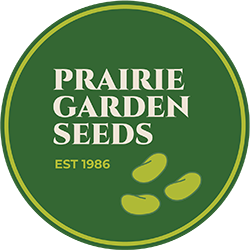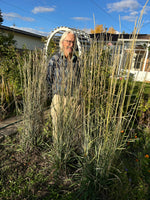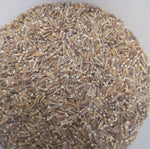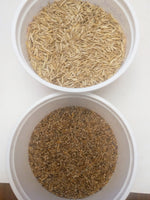Orders mailed out as time allows. Thanks for your understanding and patience. Inventory to be updated with 2025 harvest in December sometime. NOTE FOR US CUSTOMERS: Unfortunately we are no longer sending seeds to the USA at this time.
Orders mailed out as time allows. Thanks for your understanding and patience. Inventory to be updated with 2025 harvest in December sometime. NOTE FOR US CUSTOMERS: Unfortunately we are no longer sending seeds to the USA at this time.
Intermediate wheatgrass is a sod-forming perennial grass native to Europe and Western Asia which has been naturalized on the prairies of North America for nearly 100 years. It is an excellent forage crop and has an extensive root system which contributes a lot of fibre to the soil and provides good erosion control.
In the late 20th century work was done (first by Rodale and subsequently by The Land Institute) to select Thinopyrum as a seed crop, especially selecting for larger seeds and greater seed yield. This work is proceeding successfully but it will be many years before the seed yield equals that of wheat. Still, it is nutritionally similar to wheat and if it is grown at wide spacing (30” - 36”) it maintains its seed yield for a decade.
We harvested our first crop of Intermediate Wheat Grass in October 2024. Most of the plants were over 1.5 metres tall and yielded from 15 to over 100 heads per plant. There was a small amount of ergot in the heads. Jim hopes to plant seed of the best plants in 2025, which should give a harvest in 2026, as well as ongoing production from the existing plants. Strongly rubbing and winnowing the seed removes most of the hulls.
Thinopyrum can be grown both for forage and seed production and, for this purpose, it is usually intercropped with a legume. Seeding is usually in early fall - late August to early September. When grown as a seed crop it is usually known as kernza. In the initial sample we received, 100 plump seeds weighed somewhat under a gram, a big increase over the seed size from the wild plant, but 100 seeds of bread wheat weigh around 5g. From our 2024 crop the weight of 100 of the best seeds was just over 1 gram. It has been suggested that it will take 100 years of selection/breeding to approach the yield and seed size of wheat so there is lots of work we can do.
We are offering 2g packets of de-hulled seed. This is a perennial grass but if you wish to work on its improvement, we suggest that you select the best seeds and/or plants and use this seed to plant a new patch each year. For more information see Thinopyrum intermedium on wikipedia.
Thinopyrum intermedium
Other




